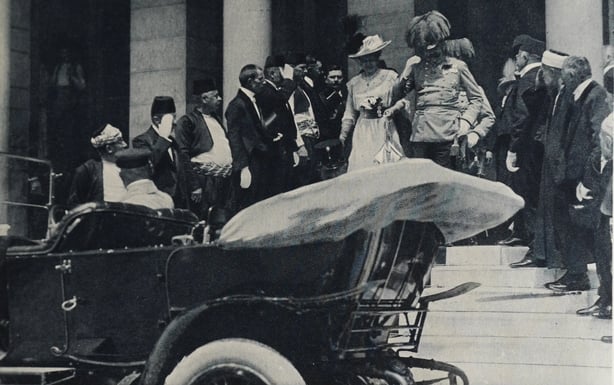Thunder Across the Sea: Europe and the Outbreak of World War I [1914]
After years of growing nationalism in Europe, the jostling for power and position led to intense rivalries over colonial possessions, eventually plunging Europe into a savage
conflict that would redraw the map of the continent—and the globe.
The Great War (The World in 1914)
#1 Russia 5,971,000
#2 Germany 4,500,000
#3 France 4,017,000
#4 Austria-Hungary 3,000,000
#5 Italy 1,251,000
#6 Great Britain 975,000
#7 Japan 800,000
#8 Romania 290,000
#9 Bulgaria 280,000
#10 Greece 230,000
#11 Turkey 210,000
#12 Serbia 200,000
#13 United States 125,000
#14 Belgium 117,000
#15 Montenegro 50,000
#16 Portugal 40,000
World War I was the first time in American history that the United States sent soldiers abroad to defend foreign soil. On April 6, 1917, when the United States declared war against Germany, the nation had a standing army of 127,500 officers and soldiers. By the end of the war, four million men had served in the United States Army, with an additional 800,000 in other military service branches.

Long Term Causes: How and why did the conflict get started in Europe
For several years there had been growing nationalism and competition in Europe – a jostling for power and position. Rivalries were playing out over the acquisition of colonies and overseas territories
Jingoism is nationalism in the form of aggressive foreign policy, such as a country's advocacy for the use of threats or actual force, as opposed to peaceful relations, in efforts to safeguard what it perceives as its national interests. Colloquially, jingoism is excessive bias in judging one's own country as superior to others — an extreme type of nationalism.
Militarism (arms race; proliferation) Mahan – to be a world power you had to have a strong Navy to establish and protect military and commercial interests). European countries building bigger and better Navy’s and building stronger armies
Alliances and the Balance of Power – Nations for rivalries and a series of interlocking alliances to offset the power of each other; general balance of power so one country isn’t running the show World War I Alliances
Imperialism – Countries taking over weaker, less developed countries
Nationalism – German is knit together out of nationalist sentiments in 1870
Desire for self-determination (Philippines, Cuba etc). Nations trying to be the most dominant and awakening Asian power (mainly Japan) trying to position themselves in this power structure.

Immediate Causes of the Great War - June 28, 1914
The political assassination of Archduke Ferdinand (heir to the throne of the Austria-Hungarian empire) by a Serbian nationalist who wants independence/autonomy – Remember Cuba? Remember the Philippines?



World War I is the first modern war it looks like what we think of war today - airplanes, tanks, poison gas, and an incredible loss of life (total war). Trench Warfare - mud - dead bodies - hell on earth. Massive loss of life and massive slaughter but not a lot of territorial gains and not a lot of movement.

Comments (0)
You don't have permission to comment on this page.